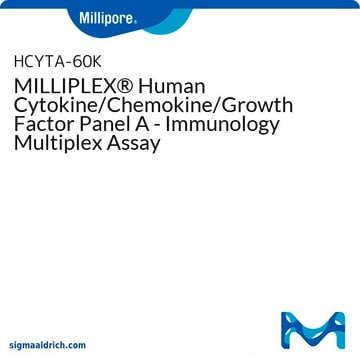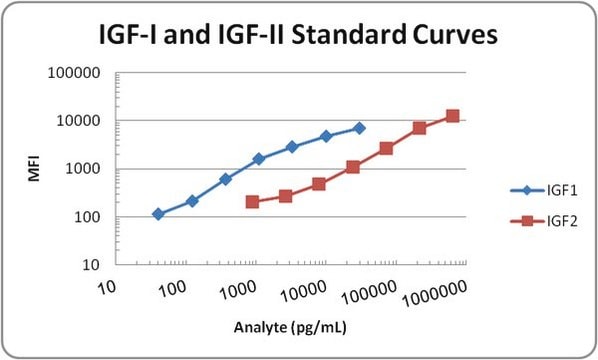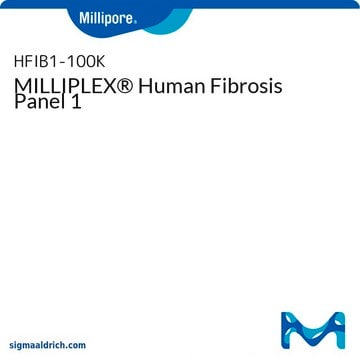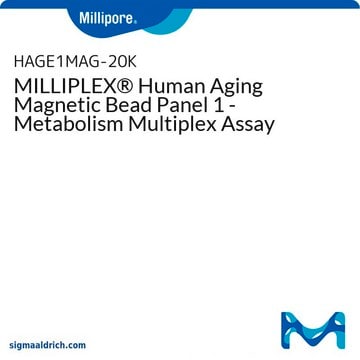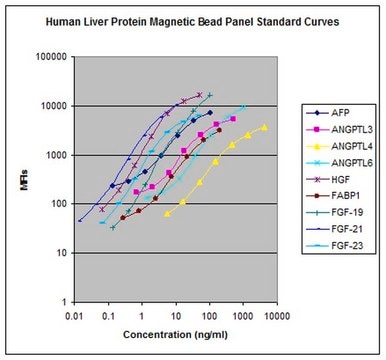HMYOMAG-56K
MILLIPLEX® Human Myokine Magnetic Bead Panel
The Human Myokine Panel, using the Luminex xMAP technology, enables the simultaneous analysis of 15 myokine protein biomarkers in human serum, plasma and cell/tissue culture samples.
About This Item
Recommended Products
Quality Level
species reactivity
human
manufacturer/tradename
Milliplex®
assay range
accuracy: 100%
(Apelin)
accuracy: 92%
(IL-15)
accuracy: 96%
(FSTL-1)
accuracy: 97%
(LIF)
accuracy: 98%
(Oncostatin M (OSM))
sensitivity: 0.9 pg/mL
(MinDC+2SD; IL-6)
sensitivity: 14 pg/mL
(MinDC+2SD; FGF-21)
sensitivity: 259 pg/mL
(MinDC+2SD; Myostatin/GDF8)
sensitivity: 281 pg/mL
(MinDC+2SD; Irisin)
sensitivity: 4 pg/mL
(MinDC+2SD; LIF)
sensitivity: 40 pg/mL
(MinDC+2SD; Fractalkine/CX3CL1)
sensitivity: 5 pg/mL
(MinDC+2SD; IL-15)
sensitivity: 59 pg/mL
(MinDC+2SD; Osteocrin/Musclin)
sensitivity: 6 pg/mL
(MinDC+2SD; Oncostatin M (OSM))
sensitivity: 64 pg/mL
(MinDC+2SD; Apelin)
sensitivity: 7.5 ng/mL
(MinDC+2SD; Osteonectin (SPARC))
sensitivity: 737 pg/mL
(MinDC+2SD; Follistatin-like Protein 1 (FSTL1))
sensitivity: 815 pg/mL
(MinDC+2SD; Erythropoietin (EPO))
sensitivity: 9 pg/mL
(MinDC+2SD; BDNF)
sensitivity: 9.8 pg/mL
(MinDC+2SD; FABP3)
standard curve range: 0.6-2,400 pg/mL
(IL-6)
standard curve range: 10-40,000 pg/mL
(LIF)
standard curve range: 122-500,000 pg/mL
(Apelin)
standard curve range: 2-10,000 pg/mL
(BDNF)
standard curve range: 2-10,000 pg/mL
(IL-15)
standard curve range: 2-6,000 pg/mL
(Oncostatin M (OSM))
standard curve range: 24-100,000 pg/mL
(FABP3)
standard curve range: 244-1,000,000 pg/mL
(Erythropoietin (EPO))
standard curve range: 244-1,000,000 pg/mL
(Irisin)
standard curve range: 488-2,000,000 pg/mL
(Follistatin-like Protein 1 (FSTL1))
standard curve range: 488-2,000,000 pg/mL
(Myostatin/GDF8)
standard curve range: 49-200,000 pg/mL
(Fractalkine/CX3CL1)
standard curve range: 49-200,000 pg/mL
(Osteocrin/Musclin)
standard curve range: 5-20,000 pg/mL
(FGF-21)
standard curve range: 7-30,000 ng/mL
(Osteonectin (SPARC))
inter-assay cv: <15%
intra-assay cv: <10%
(Apelin)
inter-assay cv: <15%
intra-assay cv: <10%
(BDNF)
inter-assay cv: <15%
intra-assay cv: <10%
(Erythropoietin (EPO))
inter-assay cv: <15%
intra-assay cv: <10%
(FABP3)
inter-assay cv: <15%
intra-assay cv: <10%
(FGF-21)
inter-assay cv: <15%
intra-assay cv: <10%
(Follistatin-like Protein 1 (FSTL1))
inter-assay cv: <15%
intra-assay cv: <10%
(Fractalkine/CX3CL1)
inter-assay cv: <15%
intra-assay cv: <10%
(IL-15)
inter-assay cv: <15%
intra-assay cv: <10%
(IL-6)
inter-assay cv: <15%
intra-assay cv: <10%
(Irisin)
inter-assay cv: <15%
intra-assay cv: <10%
(LIF)
inter-assay cv: <15%
intra-assay cv: <10%
(Myostatin/GDF8)
inter-assay cv: <15%
intra-assay cv: <10%
(Oncostatin M (OSM))
inter-assay cv: <15%
intra-assay cv: <10%
(Osteocrin/Musclin)
inter-assay cv: <20%
intra-assay cv: <10%
(Osteonectin (SPARC))
technique(s)
multiplexing: suitable
detection method
fluorometric (Luminex xMAP)
shipped in
wet ice
General description
MILLIPLEX® Human Myokine Panel is a15-plex kit to be used for the simultaneous quantification of any or all of the following analytes in human serum,plasma and cell/tissue supernatant samples: Fractalkine/CX3CL1, BDNF, Oncostatin M (OSM), Osteonectin (SPARC), LIF, FGF-21, Erythropoietin (EPO), IL-15, IL-6, Apelin, Myostatin/GDF8, Irisin, Osteocrin/Musclin, FABP3 and Follistatin-Like Protein (FSTL 1). This kit uses a 96-well format, contains a lyophilized standard cocktail, two internal assay quality controls and can measure up to 38 samples in duplicate.
The Luminex® xMAP® platform uses a magnetic bead immunoassay format for ideal speed and sensitivity to quantitate multiple analytes simultaneously, dramatically improving productivity while conserving valuable sample volume.
Panel Type: Metabolism
Application
- Analytes: Apelin (APLN), Brain-derived Neurotrophic Factor (BDNF), Erythropoeitin (EPO), Fatty Acid-Binding Protein 3 (FABP3), Fibroblast Growth Factor 21 (FGF21), Fractalkine (CX3CL1), Follistatin-Like 1 Protein (FSTL-1), IL-6, IL-15, Irisin, Leukemia Inhibitory Factor (LIF), Myostatin (MSTN/GDF8), Oncostatin M (OSM), Osteocrin (OSTN/Musclin), Osteonectin (SPARC)
- Recommended Sample Type: Human serum, plasma, and cell/tissue culture supernatants or lysates
- NOTE: Substantial amounts of BDNF are stored in circulating platelets and subsequently released upon platelet activation. Therefore, platelet-poor plasma is critical to ensure accurate measurement of circulating levels of BDNF.
- Recommended Sample Dilution: 25 μL per well of 1:2 diluted serum or plasma. Cell/tissue culture samples may be run neat or appropriately diluted in control media.
- Assay Run Time: Overnight (16-18 hours) at 2-8°C or 2 hours at room temperature (20-25°C)
- Research Category: Bone
- Research Subcategory: Metabolism
Features and Benefits
Other Notes
Legal Information
Signal Word
Danger
Hazard Statements
Precautionary Statements
Hazard Classifications
Acute Tox. 3 Dermal - Acute Tox. 4 Inhalation - Acute Tox. 4 Oral - Aquatic Chronic 2 - Eye Dam. 1 - Skin Irrit. 2 - Skin Sens. 1 - STOT RE 2
Target Organs
Respiratory Tract
Storage Class Code
6.1C - Combustible acute toxic Cat.3 / toxic compounds or compounds which causing chronic effects
Certificates of Analysis (COA)
Search for Certificates of Analysis (COA) by entering the products Lot/Batch Number. Lot and Batch Numbers can be found on a product’s label following the words ‘Lot’ or ‘Batch’.
Already Own This Product?
Find documentation for the products that you have recently purchased in the Document Library.
Our team of scientists has experience in all areas of research including Life Science, Material Science, Chemical Synthesis, Chromatography, Analytical and many others.
Contact Technical Service